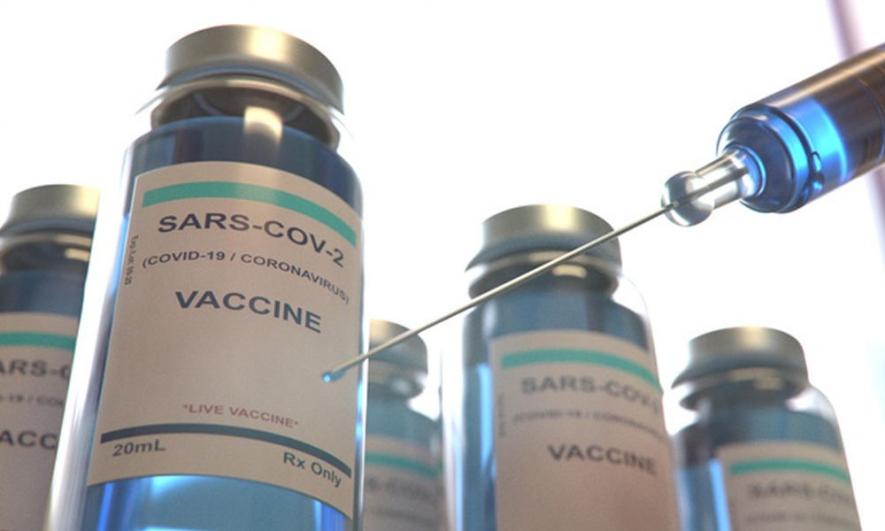COVID-19: Two Vaccine Candidates Show Encouraging Results in Trials

Representational image. | Image Courtesy: The Logical Indian
Two candidate vaccines for COVID-19 have shown encouraging results in their human trials. The first is from Moderna, the US-based biotech company, the other is from the Oxford Vaccine Group. Candidate vaccines from both, Moderna and Oxford, are in stage three of clinical trials, the results of which are expected in a few months.
The New England Journal of Medicine reported that Moderna’s candidate vaccine showed immune response in all the participants and more importantly, the vaccine candidate was found to be safe.
Moderna was the first enterprise to have conducted human trials, back in March. Named mRNA-1273, the candidate vaccine is a genetically engineered one which uses mRNA technology (Messenger RNA is a single-stranded RNA molecule that corresponds to the genetic sequence of a gene). The candidate vaccine has mRNA, which encodes the novel coronavirus spike protein, a process essential in getting the virus attached to human cells and enter the body.
The theory being taken forward is that when the mRNA is injected into the body, it would make copies of the viral spike proteins, henceforth eliciting immunity against it. If further attacked by the virus, immunity developed as a result of the vaccine would wipe out the viral attack. It needs to be mentioned here that the spike protein has become one of the main targets in vaccine production and also other therapies. The idea is that if the spike protein could be made inactive, the virus will never be able to attach itself to a human cell and enter it.
In the stage one clinical trial conducted by Moderna, 45 healthy adults within between the ages of 18 and 55 were administered the candidate vaccine in three doses—25 micrograms, 100 micrograms and 250 micrograms. There were 15 participants in each of the dosage groups and all of them received two vaccinations within a gap of 28 days.
After the first vaccination, antibody response was found to be higher in higher doses and after the second vaccination, the antibody levels increased. It was reported that the 100 micrograms dose elicited high neutralisation responses and T cell immune response (T cell, a lymphocyte, plays a central role in immune response).
This seems to be a good result as far as the first stage of a clinical trial is concerned. In the first stage, the safety of a candidate vaccine is what is primarily looked into, along with how capable it is of eliciting an immune response. The dose in this stage also indicates the ideal dose to be administered in the subsequent stage.
Regarding the Oxford University’s candidate vaccine, media reports showed that it could provide double protection by both, antibodies and killer T cell activation. In the case of the novel coronavirus one aspect of the immune response has become prominent. The antibodies generated against the virus may be short lived, and last for only a few months. In that case, for longer immunity against the virus, T cell immunity plays a pertinent role.
The Oxford vaccine candidate is also under in the third stage of clinical trials. On June 27, Brazil began the phase three clinical trial of the Oxford candidate vaccine. The results from the first stage will be published by Monday in the science journal Lancet. Its clinical trial began in April. According to David Carpenter, chairman of the Berkshire Research Ethics Committee, which approved the Oxford trial, the vaccine team was "absolutely on track".
The Oxford candidate vaccine, ChAdOx1, is a weakened version of a virus that causes common cold in chimpanzees and has been genetically engineered so that it can not grow inside the human body.
Vaccines have become the most sought-after remedy for COVID-19 and there are several efforts for a candidate across the globe. According to the WHO, there a total of 23 candidate vaccines that have entered clinical trials.
Aside from Moderna and Oxford, the other pharma giant, China’s Sinovac, is preparing a vaccine in the form of an inactive version of the virus. Sinovac’s candidate vaccine is also in the third stage of clinical trials while the rest of the candidate vaccines are either in stage one or stage two of clinical trials.
Get the latest reports & analysis with people's perspective on Protests, movements & deep analytical videos, discussions of the current affairs in your Telegram app. Subscribe to NewsClick's Telegram channel & get Real-Time updates on stories, as they get published on our website.
























